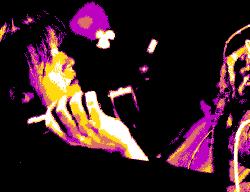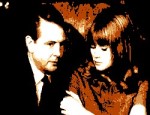Film Review
Despite its blockbuster budget and impressive cast line-up,
Belphégor
- Le fantôme du Louvre is nothing more than a pale imitation of the worst
kind of special-effects-driven Hollywood fantasy fare. The film's biggest
deficiency is its risibly bad script which cobbles together some feeble science fiction
ideas and the odd reference to Egyptology in a meagre, ham-fisted attempt to entertain
a mainstream cinema audience. The meanest of intelligence would be insulted by the
puerile nonsense that masquerades as a plot, in a film that takes itself so seriously.
The story makes no sense whatsoever, virtually every one of the characters in this film
is a two-dimensional caricature, and the special effects - ostensibly the film's
main selling point - are over-used and already look pretty dated. If there's
one category of film that France consistently does really badly, it is this kind of spectacular
fantasy blockbuster. Few, however, go as badly wrong as this one...
© James Travers 2005
The above content is owned by frenchfilms.org and must not be copied.
Next Jean-Paul Salomé film:
Arsène Lupin (2004)
Film Synopsis
A collection of ancient Egyptian artefacts dating back three thousand years
is taken to the Louvre Museum in Paris for analysis and classification.
The prize of the collection is an ornate sarcophagus, which is examined with
interest by Glenda Spencer, a leading Egyptologist from England. She
is certain that the mummy housed within the sarcophagus is the evil Belphegor.
As the artefact is probed by a laser scanner a ghostly spirit escapes from
the sarcophagus and finds its way into the museum's electrical system, resulting
in a sudden power cut. It is at this moment that a young woman named
Lisa who lives nearby innocently enters the Louvre to recover her cat.
The mysterious spirit from the sarcophagus transfers itself into her body
and she becomes the unwitting host of Belphegor's miraculously preserved
life force. Thus possessed, Lisa makes off with the Egyptian exhibits
on display in the museum. As the Louvre's collection of artefacts dwindles,
detective Verlac is given the task of uncovering the identity of the thief...
© James Travers
The above content is owned by frenchfilms.org and must not be copied.
Similar Films
Here are some other films you may enjoy watching:
Other related links:
Film Credits
- Director: Jean-Paul Salomé
- Script: Jean-Paul Salomé, Danièle Thompson, Jérôme Tonnerre, Arthur Bernède (novel)
- Cinematographer: Jean-François Robin
- Music: Bruno Coulais
- Cast: Sophie Marceau (Lisa),
Michel Serrault (Verlac),
Frédéric Diefenthal (Martin),
Julie Christie (Glenda Spender),
Jean-François Balmer (Bertrand Faussier),
Patachou (Geneviève),
Lionel Abelanski (Simonnet),
Françoise Lépine (Suzanne Dupré),
François Levantal (Mangin),
Jacques Martial (Félix),
Philippe Maymat (Bob),
Pierre Aussedat (Pierre Desfontaines),
Matteo Vallon (Cemetary employee),
Jean-Claude Bolle-Reddat (Cemetary warden),
Juliette Gréco (Woman in the cemetary),
Olivier Claverie (Forensic surgeon),
Bela Grushka (Madame Mozovski),
Rémy Roubakha (Chief worker),
Christof Veillon (Photographer),
Jean-Christophe Herbeth (Pupitror)
- Country: France
- Language: French
- Support: Black and White / Color
- Runtime: 97 min
- Aka: Belphecor: Curse of the Mummy ;
Belphegor, Phantom of the Louvre



